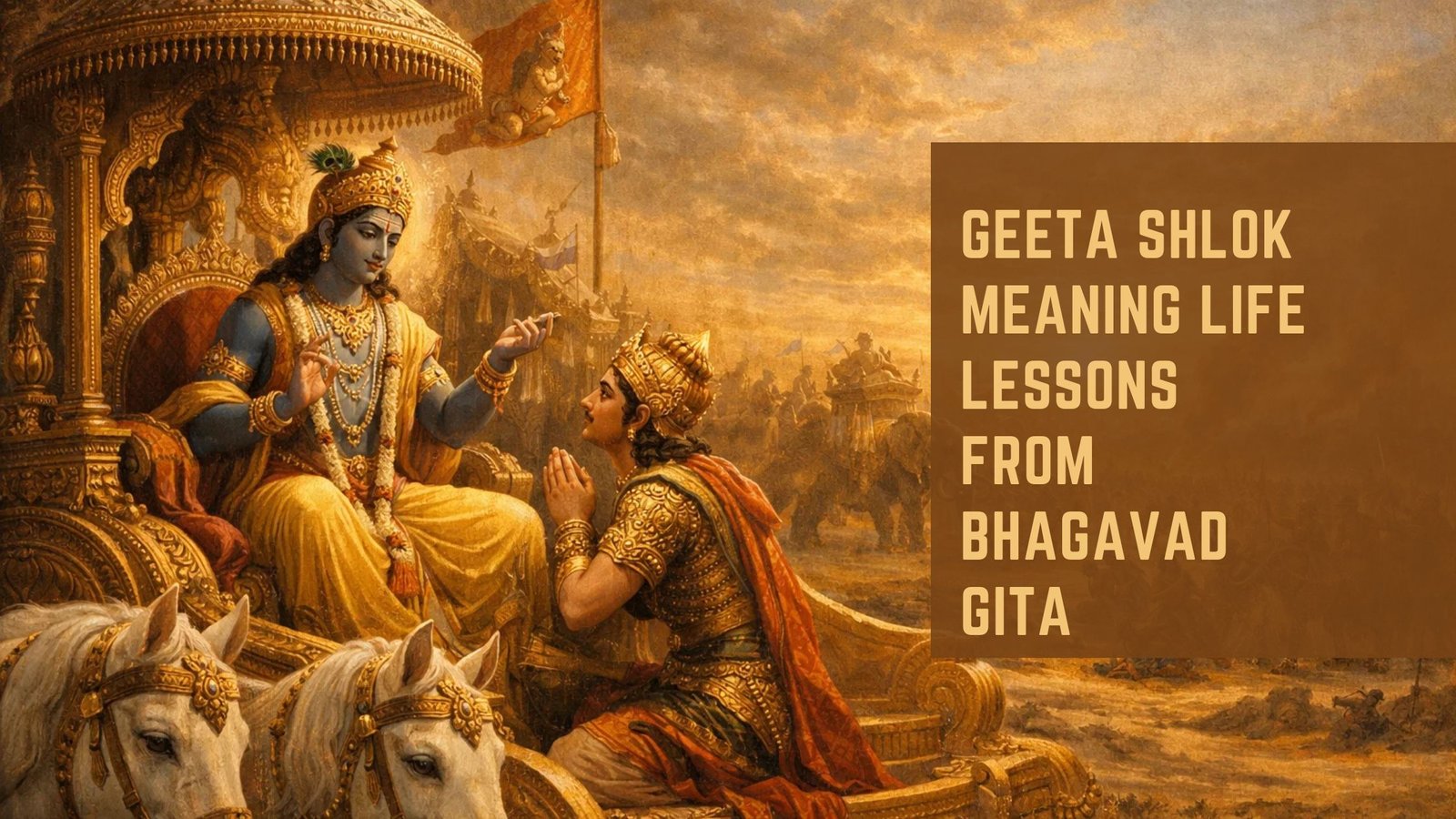The Bhagavad Gita, often referred to simply as the Gita, is a 700-verse Hindu scripture that is part of the Indian epic Mahabharata. It is a dialogue between Prince Arjuna and Lord Krishna, who serves as his charioteer. This sacred text addresses the moral and philosophical dilemmas faced by Arjuna as he prepares to go into battle against his own relatives, teachers, and friends.
The Gita delves into profound themes such as duty (dharma), righteousness, and the nature of reality, offering insights that transcend time and culture. It serves not only as a spiritual guide but also as a philosophical treatise that has inspired countless individuals across generations. At its core, the Bhagavad Gita emphasizes the importance of selfless action and devotion.
Krishna imparts wisdom to Arjuna, urging him to rise above his doubts and fears. The text encourages individuals to perform their duties without attachment to the results, promoting a sense of detachment that leads to inner peace. The teachings of the Gita resonate with those seeking clarity in their lives, providing a framework for understanding one’s purpose and the interconnectedness of all beings.
Through its rich narrative and profound insights, the Bhagavad Gita remains a timeless source of guidance for anyone navigating the complexities of life.
Key Takeaways
- The Bhagavad Gita is a sacred Hindu scripture that offers guidance on how to live a fulfilling and purposeful life.
- Inner peace can be achieved through self-reflection, mindfulness, and connecting with one’s inner self.
- Self-control is essential for maintaining a balanced and harmonious life, and it involves managing one’s thoughts, emotions, and actions.
- Overcoming negative emotions such as anger, greed, and jealousy is crucial for personal growth and spiritual development.
- Finding balance in life involves prioritizing and managing various aspects such as work, relationships, health, and personal growth.
Exploring Inner Peace
Inner peace is often described as a state of mental and emotional calmness, a sanctuary where one can find solace amidst the chaos of life. It is a profound sense of tranquility that allows individuals to navigate challenges with grace and resilience. The pursuit of inner peace is not merely an escape from external turmoil; rather, it is an active engagement with one’s thoughts and emotions.
By cultivating inner peace, individuals can foster a deeper connection with themselves and the world around them, leading to a more fulfilling existence. The Bhagavad Gita offers valuable insights into achieving inner peace through self-awareness and mindfulness. Krishna’s teachings encourage individuals to look within themselves, to confront their fears and desires, and to embrace their true nature.
By understanding the transient nature of life and the impermanence of worldly attachments, one can cultivate a sense of detachment that fosters inner tranquility. This journey inward allows individuals to discover their authentic selves, free from the distractions and expectations imposed by society. In this way, the Gita serves as a roadmap for those seeking to explore the depths of their own consciousness and attain lasting peace.
The Importance of Self-Control

Self-control is a fundamental aspect of personal development and spiritual growth. It involves the ability to regulate one’s thoughts, emotions, and actions in pursuit of higher goals. In the context of the Bhagavad Gita, self-control is not merely about restraint; it is about harnessing one’s inner strength to align with one’s higher purpose.
Krishna emphasizes that true mastery over oneself leads to liberation from suffering and ignorance. By cultivating self-control, individuals can navigate life’s challenges with clarity and purpose. The teachings of the Gita highlight that self-control is essential for maintaining balance in life.
It empowers individuals to make conscious choices rather than being driven by impulsive desires or external pressures. Through practices such as meditation and self-reflection, one can develop greater awareness of their thoughts and behaviors. This heightened awareness allows individuals to respond thoughtfully rather than react emotionally, fostering healthier relationships and a more harmonious existence.
Ultimately, self-control is a pathway to self-realization, enabling individuals to transcend their limitations and embrace their true potential.
Overcoming Negative Emotions
| Technique | Effectiveness | Difficulty |
|---|---|---|
| Mindfulness Meditation | High | Medium |
| Cognitive Restructuring | High | High |
| Deep Breathing Exercises | Medium | Low |
| Physical Exercise | High | Medium |
Negative emotions such as anger, fear, and jealousy can be significant obstacles on the path to inner peace and self-realization. These emotions often cloud judgment and lead to destructive behaviors that hinder personal growth. The Bhagavad Gita offers profound insights into overcoming these negative emotions by encouraging individuals to cultivate a mindset rooted in compassion and understanding.
Krishna teaches that by recognizing the impermanence of emotions and viewing them through a lens of detachment, one can transcend their influence. One effective approach to overcoming negative emotions is through self-inquiry and reflection. The Gita encourages individuals to examine the root causes of their feelings rather than suppressing or denying them.
By understanding the underlying beliefs and fears that give rise to negative emotions, individuals can begin to dismantle their power over them. Additionally, practicing forgiveness—both towards oneself and others—can be transformative in releasing emotional burdens. The teachings of the Gita remind individuals that they are not defined by their emotions; rather, they are capable of rising above them through conscious awareness and compassionate action.
Finding Balance in Life
In today’s fast-paced world, finding balance can often feel like an elusive goal. The Bhagavad Gita emphasizes the importance of equilibrium in all aspects of life—be it work, relationships, or personal well-being. Krishna’s teachings advocate for a holistic approach that integrates physical, mental, and spiritual dimensions.
By recognizing the interconnectedness of these elements, individuals can cultivate a sense of harmony that fosters overall well-being. Achieving balance requires conscious effort and self-awareness. The Gita encourages individuals to prioritize their duties while also nurturing their inner selves.
This involves setting boundaries, practicing self-care, and engaging in activities that bring joy and fulfillment. By aligning one’s actions with their values and purpose, individuals can create a life that reflects their true essence. Moreover, balance is not a static state but an ongoing process that requires regular reflection and adjustment.
The teachings of the Gita serve as a guiding light for those seeking to navigate the complexities of modern life while maintaining a sense of equilibrium.
Embracing the Path of Self-Realization

Self-realization is often regarded as the ultimate goal of human existence—a journey towards understanding one’s true nature and purpose in life. The Bhagavad Gita provides profound insights into this transformative process, emphasizing that self-realization is not an external pursuit but an inward journey. Krishna teaches that by transcending ego-based identities and recognizing one’s connection to the divine, individuals can awaken to their true selves.
The path of self-realization involves shedding limiting beliefs and embracing authenticity. It requires courage to confront one’s fears and insecurities while remaining open to growth and change. The Gita encourages individuals to engage in practices such as meditation, self-inquiry, and service to others as means of deepening their understanding of themselves.
Through these practices, individuals can cultivate a sense of unity with all beings, fostering compassion and empathy in their interactions with others. Ultimately, embracing the path of self-realization leads to liberation from suffering and a profound sense of fulfillment.
Cultivating Inner Peace through Meditation
Meditation is a powerful tool for cultivating inner peace and enhancing self-awareness. The Bhagavad Gita highlights the significance of meditation as a means of connecting with one’s true essence and quieting the mind’s incessant chatter. Through regular practice, individuals can develop greater clarity, focus, and emotional resilience—qualities essential for navigating life’s challenges with grace.
The Gita teaches that meditation is not merely about sitting in silence; it is an active engagement with one’s thoughts and emotions. By observing thoughts without attachment or judgment, individuals can create space for deeper insights and understanding. This practice fosters a sense of detachment from negative emotions while promoting feelings of compassion and love towards oneself and others.
Applying the Teachings of Bhagavad Gita in Daily Life
Integrating the teachings of the Bhagavad Gita into daily life can be transformative for individuals seeking greater meaning and fulfillment. The principles outlined in this sacred text provide practical guidance for navigating challenges while remaining aligned with one’s values and purpose. By embodying concepts such as selfless action, mindfulness, and compassion, individuals can create a life that reflects their true essence.
One way to apply these teachings is by approaching daily tasks with intention and awareness. Whether at work or home, individuals can strive to perform their duties with dedication while remaining unattached to outcomes. This shift in perspective fosters a sense of freedom from stress and anxiety associated with external expectations.
Additionally, cultivating gratitude for each moment—no matter how mundane—can enhance one’s appreciation for life itself. By embracing the teachings of the Bhagavad Gita in everyday situations, individuals can embark on a journey towards greater self-awareness, inner peace, and ultimately, self-realization. In conclusion, the Bhagavad Gita serves as a timeless guide for those seeking clarity amidst life’s complexities.
Its teachings on inner peace, self-control, emotional resilience, balance, self-realization, meditation, and practical application offer profound insights for personal growth. By embracing these principles in daily life, individuals can cultivate a deeper connection with themselves and others while navigating their unique journeys with grace and purpose.
In in/2024/12/08/divine-conversations-god-talks-with-arjuna-in-the-bhagavad-gita/’>Divine Conversations: God Talks with Arjuna in the Bhagavad Gita, the timeless teachings of the Bhagavad Gita come to life as Lord Krishna imparts wisdom to Arjuna on the battlefield.
Chapter 2, verse 71 of the Gita emphasizes the importance of steadfastness in the face of challenges, a theme that resonates throughout this sacred text. The article explores the divine conversations between God and Arjuna, offering insights into the eternal wisdom contained within the Gita.
FAQs
What is the significance of Bhagavad Gita chapter 2 verse 71?
Bhagavad Gita chapter 2 verse 71 emphasizes the importance of controlling one’s mind and senses in order to attain inner peace and spiritual growth. It teaches the value of self-discipline and self-control in achieving a balanced and harmonious life.
What does Bhagavad Gita chapter 2 verse 71 teach us?
This verse teaches us the importance of restraining the mind and senses from external distractions and desires. It emphasizes the need to cultivate inner strength and discipline in order to achieve spiritual enlightenment and inner peace.
How does Bhagavad Gita chapter 2 verse 71 relate to daily life?
Bhagavad Gita chapter 2 verse 71 is relevant to daily life as it encourages individuals to practice self-control and discipline in their thoughts and actions. It teaches the importance of maintaining a balanced and focused mind in order to lead a fulfilling and purposeful life.
What are the key teachings of Bhagavad Gita chapter 2 verse 71?
The key teachings of Bhagavad Gita chapter 2 verse 71 include the importance of self-discipline, controlling the mind and senses, and the significance of inner peace and spiritual growth. It emphasizes the need to overcome external distractions and desires in order to attain a state of inner harmony and balance.














